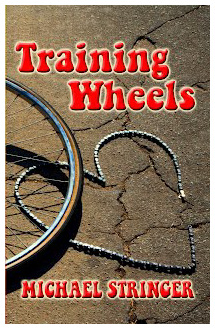Training Wheels
 A nonprofit fundraiser turned novelist, Michael Stringer, has authored a blistering fictional memoir entitled Training Wheels, a coming-of-age story that depicts a family's internal strife and struggle with radically shifting priorities and a sexually charged household atmosphere.
A nonprofit fundraiser turned novelist, Michael Stringer, has authored a blistering fictional memoir entitled Training Wheels, a coming-of-age story that depicts a family's internal strife and struggle with radically shifting priorities and a sexually charged household atmosphere.Kevin's certainly not alone in making irrational choices. After the radical '60s, many Americans turned introspective, searching for ways to redefine their beliefs about love and happiness, becoming desperately lost along the road. Kevin gets caught up in the free-love movement, too, risking everything to pursue the voluptuous girl of his dreams. Kevin's journey into first love becomes a perilous adventure that forces both families to face the bitter truths and harsh realities of their misguided decisions, of which there are many. All the mayhem reaches a fever pitch when Kevin and his disgruntled father lock horns in a ruthless showdown.
Stringer has shrewdly framed this story by blending the themes and styles of The Wonder Years, the popular TV show from the '90s, with The Ice Storm, the movie released in 1997 about the self-indulgent '70s.
"Training Wheels is a poignant and gripping family tale set in Los Angeles during an era symbolized by Watergate, happy faces, pet rocks, mood rings, and streaking," said Melissa Newman, author of House of Cleaving and Sister Blackberry. "It's no wonder that some people went a little... adrift."
During the early part of his career, Stringer wrote for newspapers and magazines until he finally decided to take on the challenge of pursuing a long-time goal, writing a novel.
Print and e-versions of Training Wheels, can be found at amazon.com and barnesandnoble.com as well as other online and bricks and mortar book stores wherever books are sold. Information about the book and the author can also be found at the publisher's website: martinsisterspublishing.com.
Review originally featured at http://superseventies.com/extra_13_2.html
Check out Super Seventies Rock Site! http://superseventies.com/


